
The Red Republican was a British newspaper espousing socialist views. It was published from 22 June 1850 to 30 November 1850, after which it was renamed The Friend of the People .

The Red Republican was a British newspaper espousing socialist views. It was published from 22 June 1850 to 30 November 1850, after which it was renamed The Friend of the People .
The paper was founded in 1850 by George Julian Harney. He had been forced to resign as editor of the Chartist newspaper Northern Star by its owner, Feargus O'Connor, who disagreed with his socialism. [1]
Harney tried to use the paper to educate the working classes about socialism and proletarian internationalism, and advocated socialism within the trade union movement. The Red Republican published the first English translation, by Helen Macfarlane, of the Communist Manifesto in 1850. The paper was not a financial success and closed down in December of the same year. [2]
Subsequently, Harney published the Friend of the People (December 1850 – April 1852), Star of Freedom (April 1852 – December 1852) and The Vanguard (January 1853 – March 1853).
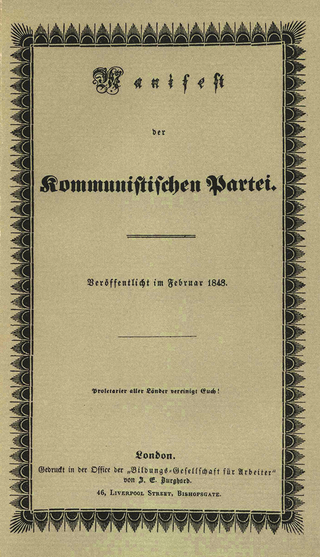
The Communist Manifesto, originally the Manifesto of the Communist Party, is a political pamphlet written by Karl Marx and Friedrich Engels, commissioned by the Communist League and originally published in London in 1848. The text is the first and most systematic attempt by Marx and Engels to codify for wide consumption the historical materialist idea that "the history of all hitherto existing society is the history of class struggles", in which social classes are defined by the relationship of people to the means of production. Published amid the Revolutions of 1848 in Europe, the manifesto remains one of the world's most influential political documents.
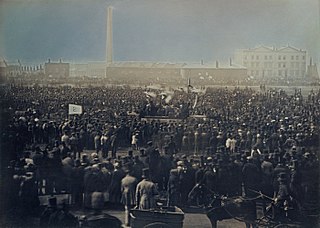
Chartism was a working-class movement for political reform in the United Kingdom that erupted from 1838 to 1857 and was strongest in 1839, 1842 and 1848. It took its name from the People's Charter of 1838 and was a national protest movement, with particular strongholds of support in Northern England, the East Midlands, the Staffordshire Potteries, the Black Country and the South Wales Valleys, where working people depended on single industries and were subject to wild swings in economic activity. Chartism was less strong in places, such as Bristol, that had more diversified economies. The movement was fiercely opposed by government authorities, who finally suppressed it.

Feargus Edward O'Connor was an Irish Chartist leader and advocate of the Land Plan, which sought to provide smallholdings for the labouring classes. A highly charismatic figure, O'Connor was admired for his energy and oratory, but was criticised for alleged egotism. His newspaper Northern Star (1837–1852) was widely read among workers, becoming the voice of the Chartist movement.
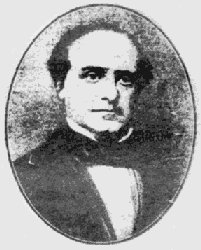
Ernest Charles Jones was an English poet, novelist and Chartist. Dorothy Thompson points out that Jones was born into the landed gentry, became a barrister, and left a large documentary record. "He is the best-remembered of the Chartist leaders, among the pioneers of the modern Labour movement, and a friend of both Marx and Engels."

William James Linton was an English-born American wood-engraver, landscape painter, political reformer and author of memoirs, novels, poetry and non-fiction.

Melita Stedman Norwood was a British civil servant, Communist Party of Great Britain member and KGB spy.
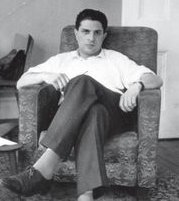
Ralph Miliband was a British sociologist. He has been described as "one of the best known academic Marxists of his generation", in this manner being compared with E. P. Thompson, Eric Hobsbawm and Perry Anderson.

William Lovett was a British activist and leader of the Chartist political movement. He was one of the leading London-based artisan radicals of his generation.

George Julian Harney was a British political activist, journalist, and Chartist leader. He was also associated with Marxism, socialism, and universal suffrage.
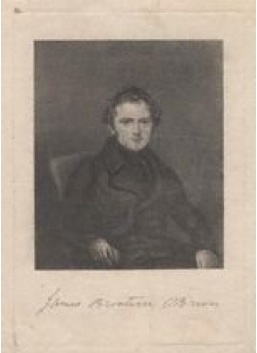
James Bronterre O'Brien was an Irish Chartist leader, reformer and journalist.

George William MacArthur Reynolds was a British fiction writer and journalist.

The Northern Star and Leeds General Advertiser was a chartist newspaper published in Britain between 1837 and 1852, and best known for advancing the reform issues articulated by proprietor Feargus O'Connor.
The Fraternal Democrats was a left-wing political international that promoted working-class internationalism. Based in London, the organisation counted members from half a dozen European countries, many of whom had fled from their home countries. The Fraternal Democrats were largely democratic, republican and socialist in orientation, although they also counted Chartists, communists and nationalists among their ranks. With its membership largely based in Britain, the organisation was never gained a truly international character, as it was unable to establish national sections within other countries. The Revolutions of 1848 resulted in much of its membership dissipating, in order to return to their native countries and participate in the revolutionary events. By the mid-1850s, the FD was succeeded by the International Association, which lay the foundations for the International Workingmen's Association (IWMA).
Helen Macfarlane, born Barrhead, 25 September 1818, Renfrewshire, Scotland, died Nantwich, Cheshire, England 29 March 1860, was a Scottish Chartist feminist journalist and philosopher, known for her 1850 translation into English of The Communist Manifesto by Karl Marx and Friedrich Engels which was published in German in 1848. Between April 1850 and December 1850, Macfarlane wrote three essays for George Julian Harney's monthly, the Democratic Review and ten articles for his weekly paper, The Red Republican. In 1851 Macfarlane "disappeared" from the political scene. Until recent research by Macfarlane's biographer David Black and BBC Radio Scotland researcher and broadcaster Louise Yeoman, very little was known for sure about her early and later life.
John Francis Bray was a radical, chartist, writer on socialist economics, and activist in both Britain and his native America in the 19th century. He was hailed in later life as the "Benjamin Franklin" of American labor.
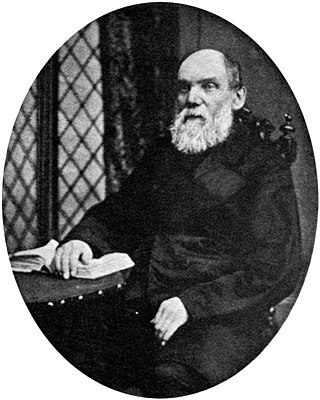
Robert George Gammage was a British surgeon and leading figure in Chartism in the 1830s and 1840s. He was also the author of the first history of the movement.

Joseph Arnold Weydemeyer was a military officer in the Kingdom of Prussia and the United States as well as a journalist, politician and Marxist revolutionary.

Socialism in the United Kingdom is thought to stretch back to the 19th century from roots arising in the English Civil War. Notions of socialism in Great Britain have taken many different forms from the utopian philanthropism of Robert Owen through to the reformist electoral project enshrined in the Labour Party that was founded in 1900 and nationalised a fifth of the British economy in the late 1940s.
Robert Kemp Philp (1819–1882) was an English journalist, author, and Chartist.